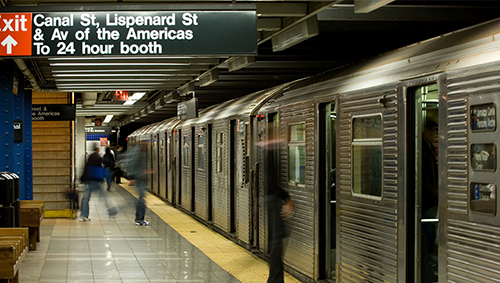英語記事に慣れる「サクっと読む英文」
2017.8.29
New York subway considers banning food on trains
Read the article to find out why the New York subway authority wants to stop people from eating on its trains.
ニューヨークの地下鉄が電車内での飲食を禁止したがっている理由について、記事を読んでみましょう。

Garbage causes big problems for the MTA and passengers. On July 17, garbage on the tracks near the 145th Street station in Manhattan caused a fire that sent nine people to the hospital and caused delays for many people who were trying to get to work.
MTA’s chairman Joseph J. Lhota pointed to the eating habits of New Yorkers as the cause of the garbage problem. Many people eat on the New York subway. On a given train, people can be seen eating anything from fast food and pizza, to Chinese take-out. Some passengers don’t clean up after themselves when they’re done eating – the left-behind garbage causes fires and attracts rats. There currently aren’t any rules forbidding food on MTA trains. According to The New York Times, Lhota suggests changing that.
“It may be an education program about what types of foods really shouldn’t be brought on,” said Lhota. It’s possible the MTA will not ban all food, but may ask riders not to eat messy food or food that attracts rats and is hard to clean up.
Transit authorities in some US cities ban eating and drinking on trains and in the stations. Passengers are prohibited from eating or drinking on trains in Washington, DC. It’s also against the rules to eat or drink on trains or buses in San Francisco, though many people ignore the rules.
Critics of the suggested food ban on New York trains say it will be hard to enforce. Gene Russianoff leads the Straphangers Campaign, a rider advocacy group. Russianoff defended subway riders who eat on the train: “There are people who have no choice – they’re going from work to school.”
In 2012, Lhota himself said banning eating on trains would hurt some communities, and that many children have their morning meal on the subway.
It’s already illegal to litter or throw garbage on New York trains, stations, and tracks. If caught and ticketed for littering, a person could pay up to $250 (about ¥28,000) in fines. Though, these laws are not strictly enforced.
In 2016, a new cleaning program called “Operation Track Sweep” was launched by the MTA. The program increased the cleaning efforts at the subway stations and resulted in a 41% reduction in track fires. Other cleanup efforts include buying three more vacuum trains, which are designed to pick up garbage from the tracks and prevent fires.
The subway in New York may tell people to stop eating on the trains. This is because the New York subway has a garbage problem. People are leaving garbage on the subway trains and train tracks. The Metropolitan Transportation Authority (MTA) runs the New York subway. They tried a few ways to fix the garbage problem, but now they may stop people from eating food on the trains.
Garbage causes big problems for the MTA and passengers. On July 17, garbage caused a fire near the 145th Street station in Manhattan. Nine people were sent to the hospital, and many people couldn’t get to work on time.
Many people eat on the New York subway. On many trains, people eat many kinds of food: fast food, pizza, and even Chinese take-out. Some passengers don’t clean up after themselves when they’re done eating, and the garbage they leave can cause fires.
MTA’s chairman Joseph J. Lhota said that some New Yorkers who eat on the train are the cause of the garbage problem. Right now, there aren’t any rules against eating food on MTA trains. According to The New York Times, Lhota talked about making some new rules.
Lhota said the MTA might make “an education program about what types of foods really shouldn’t be brought on.” The MTA also might not make a rule against all food on the train. The MTA may just ask riders not to eat food that is hard to clean up.
Some US cities do not let passengers eat or drink on trains and in the stations. Passengers can’t eat or drink on trains in Washington, DC. It’s also against the rules to eat or drink on buses in San Francisco. However, many people don’t follow the rules, and still eat on the bus.
Some people say that it will be too difficult to stop people from bringing food on the trains in New York City. Gene Russianoff is with the Straphangers Campaign, a group that speaks for subway passengers. Russianoff defended subway riders who eat on the train, saying: “There are people who have no choice – they’re going from work to school.”
In 2012, Lhota himself said making a new rule against eating on trains would hurt some communities, and that many children have their morning meal on the subway.
It’s already against the law to leave garbage on New York trains, in stations, and on train tracks. If the MTA catches people leaving garbage in these places, that person could pay up to $250 (about ¥28,000). Though, the MTA doesn’t spend much time looking for people who leave garbage.
In 2016, the MTA started a new cleaning program. The program increased cleaning at the subway stations. This resulted in a 41% less fires on train tracks. The MTA also bought three more vacuum trains, which clean up garbage from the tracks.
キーフレーズ
garbage ごみ
throw 捨てる
ban 禁止する
get to work 仕事(職場)に行く
仕事に行く、出社する、という意味です。“go to work” と同じ意味で使われています。
例:How do you get to work every day?
(仕事には毎日どのように行くのですか?)
a given train ある(特定の)電車
clean up 片付ける
attract 引き寄せる、引きつける
ものや人を魅力などで引きつける、興味や関心などを引くという意味です。
例:The low housing costs have attracted a lot of young buyers to the area.
(低い住宅費が、多くの若い購買層をこの地域に引き寄せている。)
forbid 禁止する
禁止する、という意味です。
“forbid” は一般的(日常的)で個人的なことに対して使われるのに対し、”ban” は通常、公的(法律的)に禁止するという意味で使われます。また、同じく禁止するという意味の ”prohibit” も、公的に禁止するという意味で使われることが多い表現です。
例:Cars are forbidden on this street on the weekends.
(週末、この道は車の通行が禁じられています。)
messy food (体や周辺が)汚れるような食べ物
ignore 無視する
critic (計画などを)批判する人、反対派
enforce (法律などを)実行する、施行する
法律や計画などを実際に行う、という意味です。
例:A police officer’s job is to enforce the law.
(警察官の仕事は、法律を実際に守らせることだ。)


 【Gabaからのお知らせ】
【Gabaからのお知らせ】 【特集】
【特集】 【英単語の正しい使い分け】
【英単語の正しい使い分け】 【使いこなす句動詞】
【使いこなす句動詞】